State of the Internet of Things: Wide Impact Anticipated Yet Initiatives Stall
JAN. 26, 2016 | HANOVER, MD | For media inquiries, please contact us at media@TEKsystems.com.
TEKsystems survey reveals companies are still laying the groundwork for IoT initiatives; high levels of impact are eventually expected.
TEKsystems released research regarding the state of Internet of Things (IoT) initiatives. More than 200 IT and business leaders were polled in Nov. 2015 on project ownership, implementation status, risks, required skill sets and organizational preparedness. The purpose of this survey was to gain a better understanding of how organizations are being impacted by IoT, steps they are taking to prepare, resource barriers and challenges, as well as long-term IoT objectives. See the full results here.
Key highlights from the survey include:
A Minority of IoT Initiatives Have Made it Off the Ground; Security Cited as Top Challenge
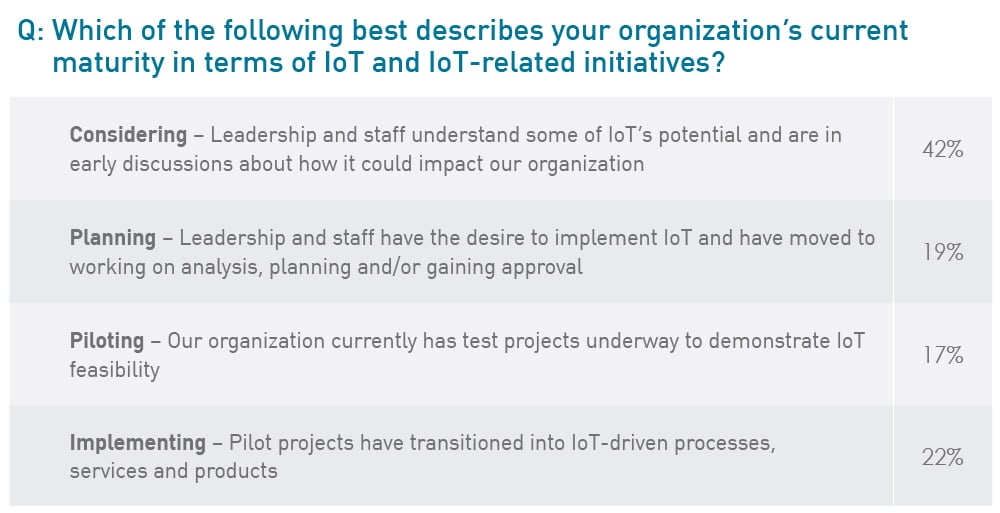
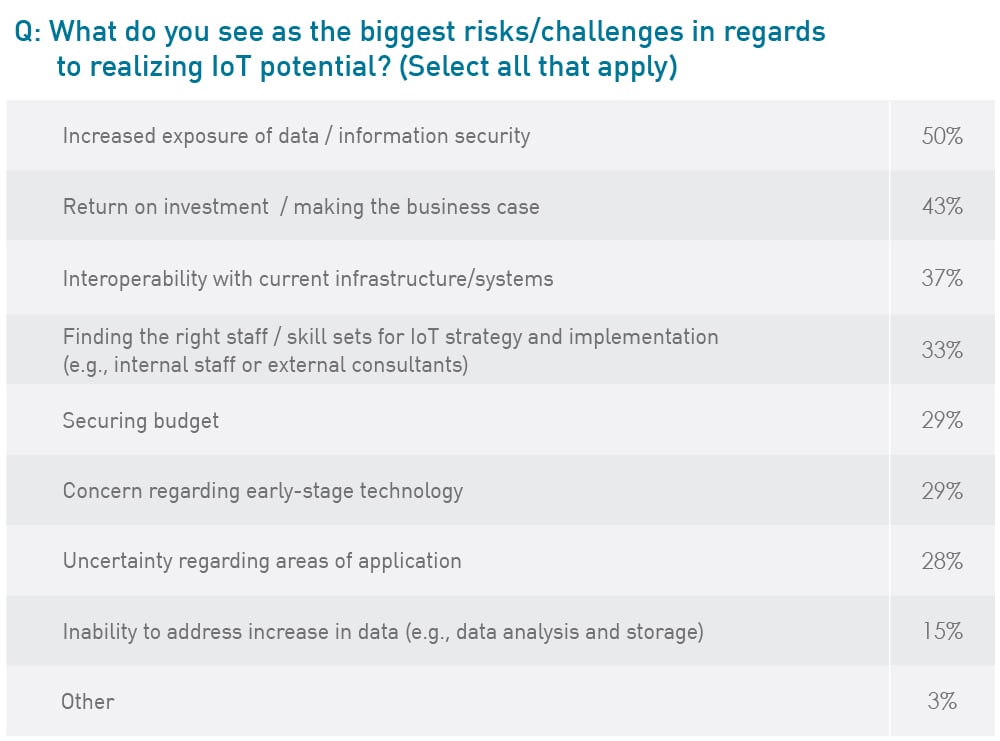
- TEKsystems’ Take: Less than one-quarter of organizations have reached the stage where IoT initiatives are transforming business processes, services and products. The vast majority are in the preparatory (consideration and planning) or pilot stages. Underlying data indicates larger organizations ($5 billion or more in annual revenue) are more likely than smaller organizations to be implementing IoT initiatives. Increased exposure of data / information security is the biggest challenge to realizing IoT potential for half of organizations. Other early stage concerns, such as return on investment (ROI) / making the business case, and interoperability with current infrastructure/systems, round out the top three risks/challenges on IT and business leaders’ minds. One-third of respondents indicate finding the right staff / skill sets is also a challenge.
IT Maintains Leadership Role for IoT Initiatives, but Organizations Can Expect Shared Responsibility and Cooperation across the Business
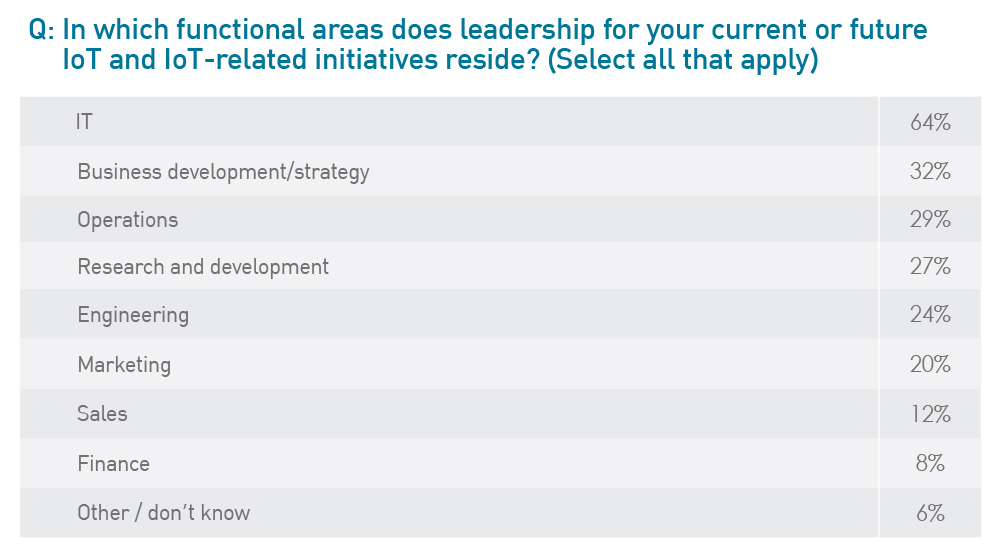
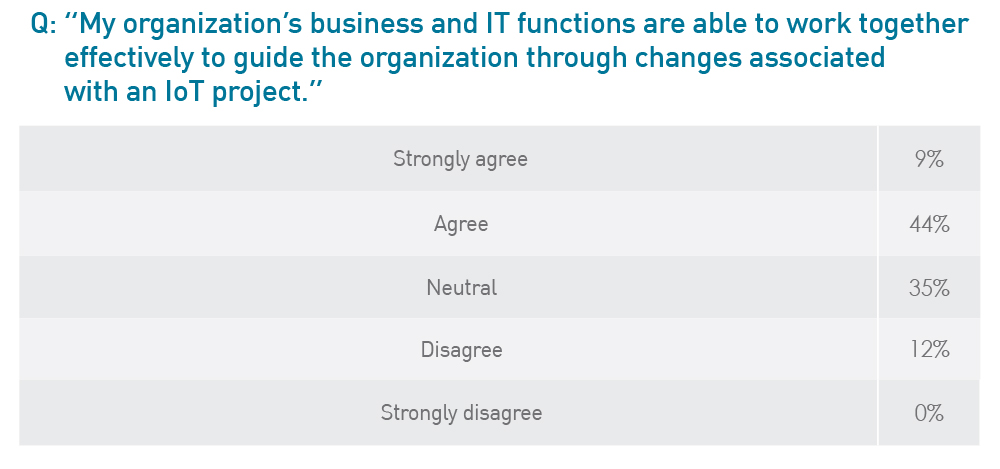
- TEKsystems’ Take: While IT maintains leadership over IoT projects in the majority of cases, other departments are also identified as occupying leadership roles, indicating shared responsibility. Organizations that are already implementing IoT are more likely to report that leadership for these initiatives resides in the area of business development / strategy, according to underlying data. The majority of organizations (53 percent) recognize that a partnership approach is necessary for IoT projects to succeed. Not surprisingly, data also shows organizations that have implemented IoT-related initiatives are more likely to agree their organization’s functions are able to work together effectively.
The Majority of Leaders Anticipate a High Level of Impact; Expectations for Long-term Digital Transformation Foreseen
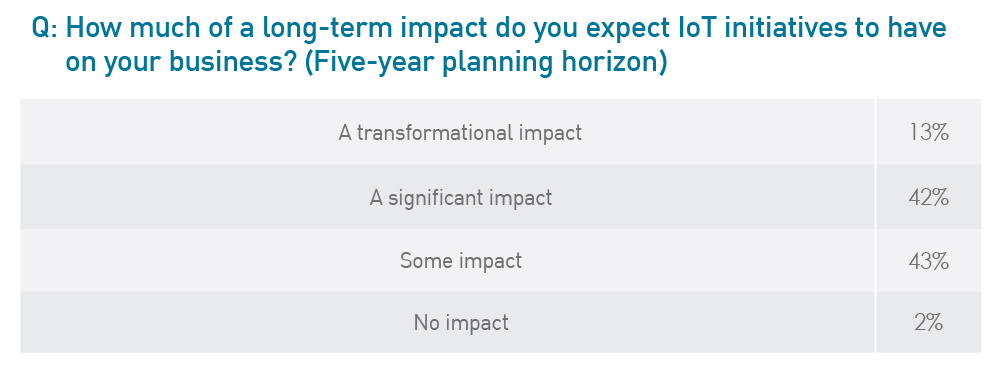
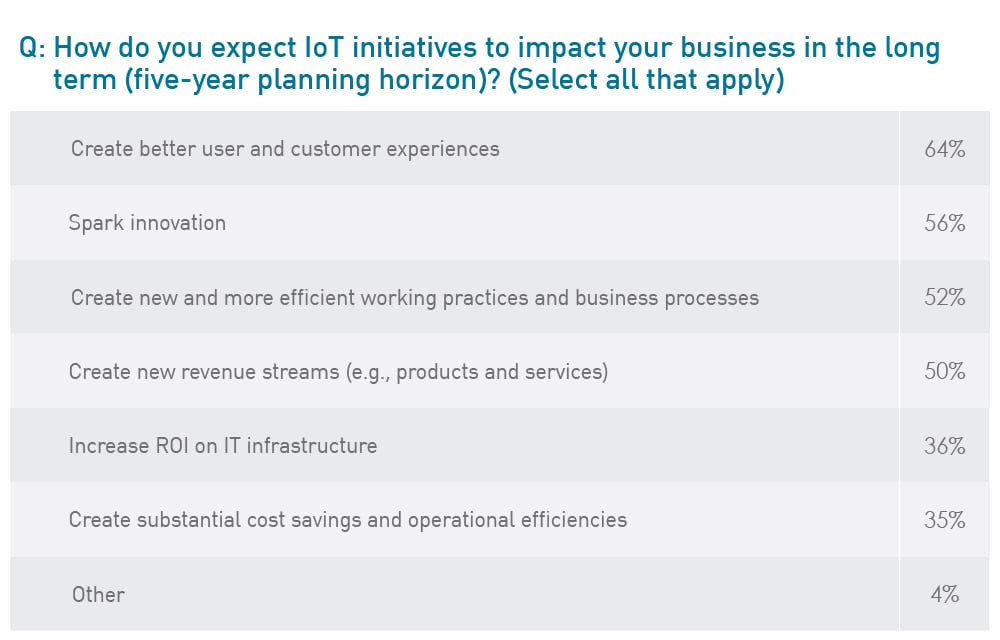
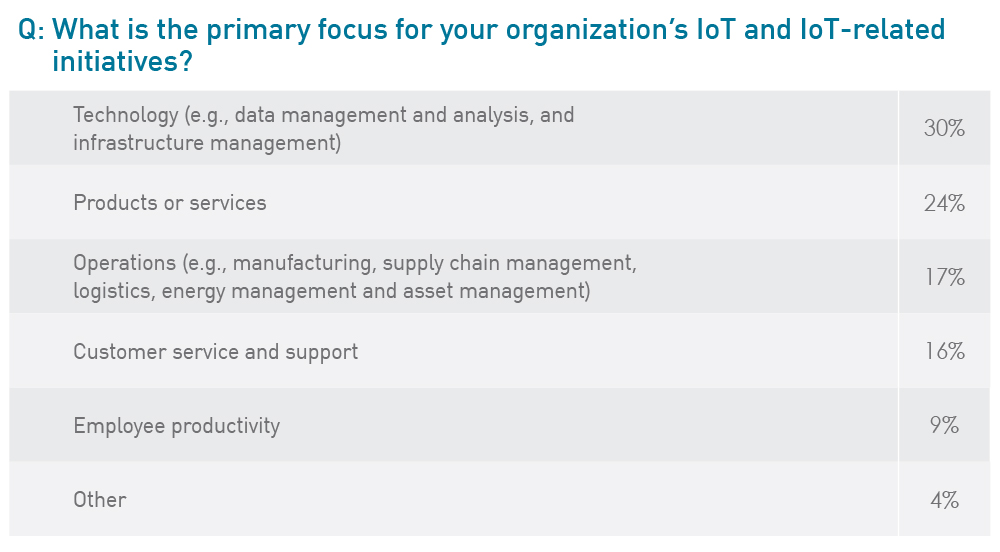
- TEKsystems’ Take: The majority of organizations (55 percent) expect IoT initiatives to have a high level of impact on their business over the next five years. Data also shows organizations that have already implemented IoT initiatives are more likely than others to expect these projects will have a transformational impact on their business. Long-term expectations for IoT include outcomes that will drive digital transformation within the business, including creating a better user and customer experience, and sparking innovation. Larger organizations are more likely than smaller organizations to expect IoT to create new revenue streams. Technology (e.g., data management and analysis, and infrastructure management) is the top focus for nearly one-third of organization’s IoT initiatives, followed by products or services.
Two-Thirds of IoT Projects to be Handled Internally, Yet Most Organizations Are Not Highly Confident in Their In-House Preparedness; Skills Needed in Infrastructure and Analysis

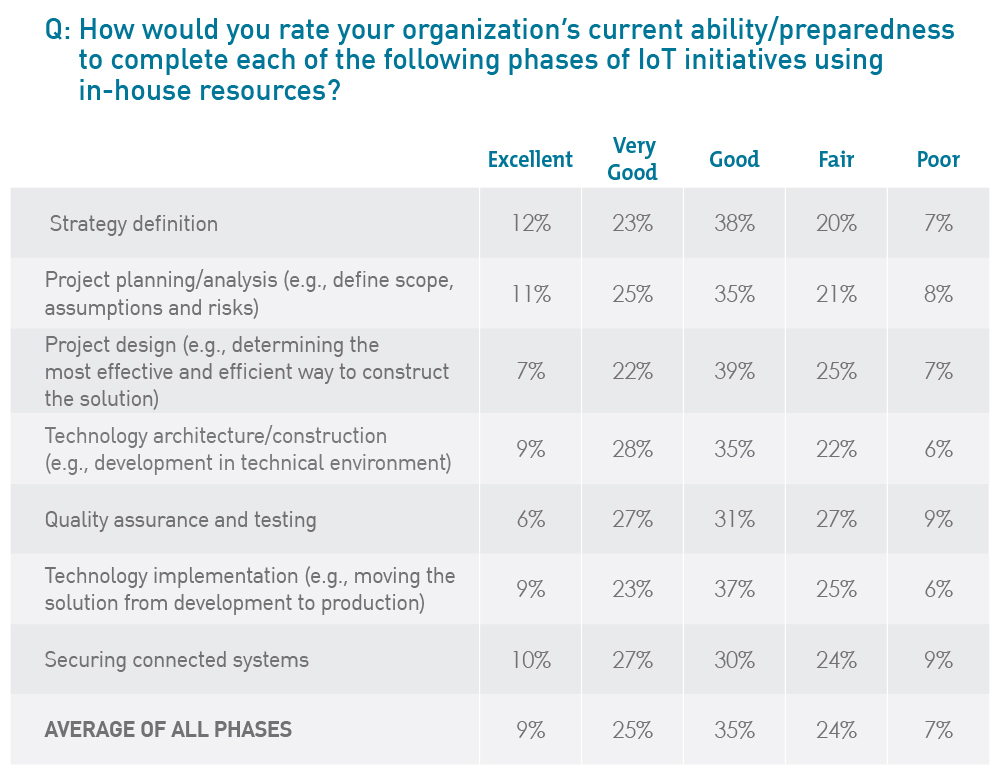
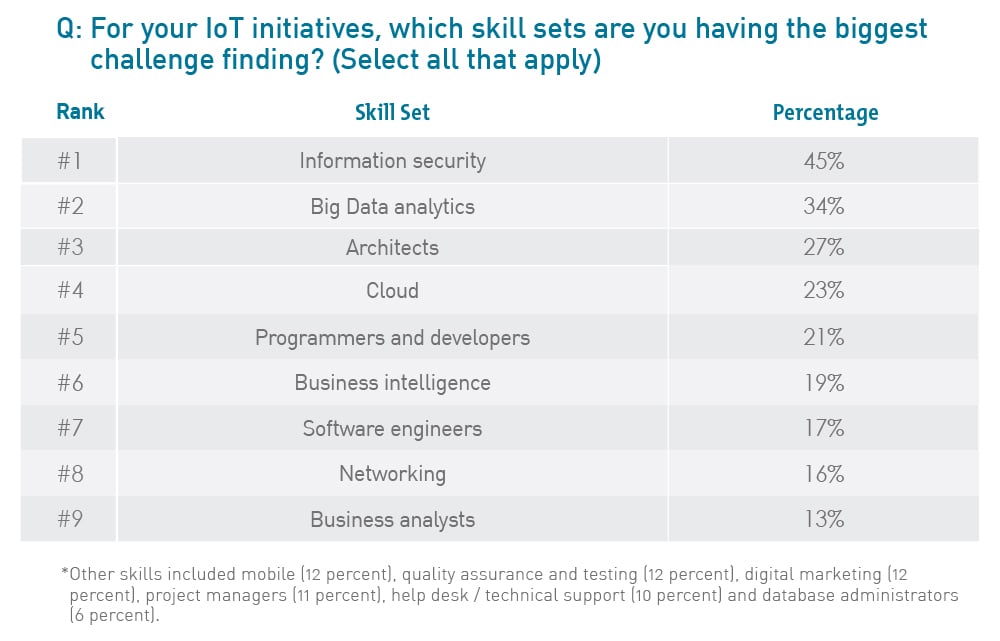
- TEKsystems’ Take: Approximately one-third of IoT project needs require support from external vendors versus internal resources. Most organizations are not highly confident in their preparedness to complete each phase of an IoT initiative in-house. Less than 4 in 10 rate their level of preparedness in each phase as excellent or very good. Those with business-related job titles are more confident than those with IT-related titles; they are more likely to rate their organizations as excellent or very good with respect to strategy definition, project planning and project design. Respondents report information security and Big Data analytics skill sets are the most challenging to source for their IoT initiatives. Organizations that have not yet reached the implementation phase are more likely to report challenges in finding software engineers.
“Organizations who are able to successfully implement IoT projects to better understand their business and customers will be positioned to make more strategic and informed decisions,” says TEKsystems Research Manager Jason Hayman. “However, only a minority of organizations have adopted IoT initiatives, despite a majority recognizing the potentially transformational impact these projects will have on their business. Part of this measured adoption is likely due to a lack of confidence that IoT initiatives can be handled internally, and concerns over information security, ROI and interoperability with current systems. Organizations that are able to develop strong partnerships internally between IT and business leadership, and externally with key staffing and services providers, will be more successful and efficient in moving through the project phases and delivering meaningful results for the business.”
TEKsystems’ Jason Hayman is available for additional commentary. For more information about the survey, or to schedule an interview, please contact Rick McLaughlin at TEKsystems@teamlewis.com.
About TEKsystems
People are at the heart of every successful business initiative. At TEKsystems, an Allegis Group company, we understand people. Every year we deploy more than 80,000 IT professionals at 6,000 client sites across North America, Europe and Asia. Our deep insights into IT human capital management enable us to help our clients achieve their business goals–while optimizing their IT workforce strategies. We provide IT staffing solutions and IT services to help our clients plan, build and run their critical business initiatives. Through our range of quality-focused delivery models, we meet our clients where they are, and take them where they want to go, the way they want to get there.